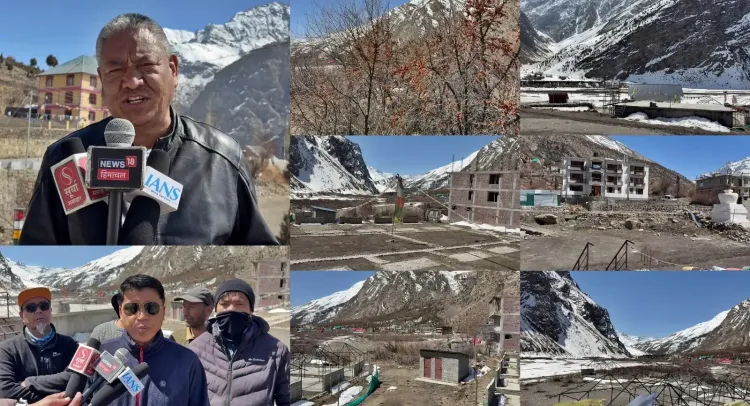Himachal Pradesh Government Faces Intense Criticism Over Two Proposed Hydropower Projects in Lahaul-Spiti

Synopsis
Key Takeaways
- Local Opposition: Significant backlash from communities.
- Environmental Concerns: Risks to the fragile ecology of Lahaul-Spiti.
- Employment Potential: Projects promise 5,000 job opportunities.
- Historical Context: Previous successful opposition to similar projects.
- Call to Action: Community pledges to protest if MoU is not revoked.
Lahaul-Spiti (Himachal Pradesh), March 31 (NationPress) In a decision that has ignited significant backlash from the local populace in Lahaul-Spiti, the Himachal Pradesh government entered into a Memorandum of Understanding (MoU) with the Telangana government on March 29 for the establishment of two substantial hydropower projects — Miyar (120 MW) and Seli (400 MW).
This initiative has faced vehement opposition from community organizations who contend that it grossly overlooks the delicate ecological equilibrium, tribal rights, and the feelings of the public.
The MoU was inked in the presence of Himachal Pradesh Chief Minister, Sukhvinder Singh Sukhu, and Telangana Deputy Chief Minister, Mallu Bhatti Vikramarka.
The projects aim to bolster Telangana’s renewable energy capacity by leveraging Himachal Pradesh’s abundant hydropower resources. However, this action has escalated tensions in the fragile, ecologically-sensitive area of Lahaul-Spiti.
Local leaders, united under the banner of 'Lahaul-Spiti Ekta Manch', have pledged to initiate a large-scale protest if the government does not annul the agreement. Rigzin Hayrappa, the forum's convener, voiced strong discontent, stating, "The Himachal government is intent on eradicating the existence of Lahaul-Spiti. We will not stand for this. The community is prepared for a decisive struggle to safeguard our land, environment, and way of life."
Representatives from various organizations, including 'Save Lahaul-Spiti', 'Chanderbhaga Sangharsh Samiti', and Spiti Civil Society, have joined the demonstrations. Notable individuals like B.S. Rana, Prem Chand Katoch, Vikram Katoch, and Prem Lal Yoterpa from 'Save Lahaul-Spiti', along with others such as Kunga Bodh, Sachin Merupa, and Ram Gaur, have vocally condemned the government’s actions.
Tenzin Katoch, a pivotal member of the Ekta Manch, highlighted the associated risks: “Lahaul-Spiti is the last district in Himachal Pradesh where rivers flow freely. The region’s fragile geology renders it inappropriate for large-scale hydropower initiatives. We do not wish for Lahaul-Spiti to mirror Uttarakhand or Kinnaur, where such projects have caused environmental devastation and displaced local communities.”
Tenzin Katoch further stated, “We will not hesitate to embark on hunger strikes and conduct sit-ins if the government remains unyielding. We believe the Himachal government still has an opportunity to reverse this decision.”
Rigzin Hayrappa cautioned, “Should the government fail to rescind the MoU, we will mobilize a substantial movement. Every household in Lahaul-Spiti will unite to defend our land, rivers, and culture.”
The Opposition has a long-standing tradition of opposing such initiatives. In 2007, locals successfully thwarted a dam project that threatened the displacement of numerous villages. Now, with 14 large projects proposed in the region, activists are increasingly concerned about irreversible environmental harm and dislocation.
Both projects are projected to be established at a cost of approximately Rs 6,200 crore on the Chenab river and are anticipated to create 5,000 direct and indirect employment opportunities. This represents the first collaboration of its kind in the history of the state aimed at harnessing its hydropower potential.









